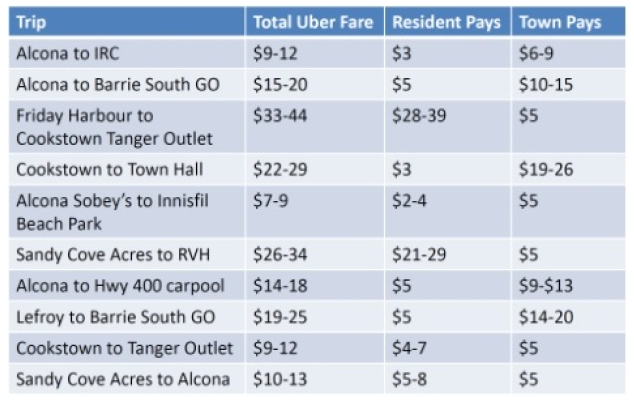There’s an extremely interesting experiment taking place in the tiny town of Innisfil, population 36,566. Uber has descended on the rural shores of the Ontario town, providing transportation to residents at a vastly subsidized rate.The reason? Innisfil is in dire need of public transportation, but the sprawled out nature of the town and subsequent lack of density makes public transit a financially unviable option. Enter Uber Canada — the ride-sharing giant struck a deal with city officials to fill this transport vacuum, in the hopes of expanding its presence beyond urban Canada.“We want to encourage as many people as we can to leave the personal car at home, and rather than driving into other cities, connect to local transit hubs and think about connecting to public transit in that manner,” Uber Canada Public Policy manager Chris Schafer told the Globe and Mail on Monday.Here’s how the system will work — if you’re traveling within the town of Innisfil, or to and from the area between the town hall and the town’s recreational centre, you will only pay Uber $3. That’s roughly what a one-way ride costs on public transit. Keep in mind, it’s not like Uber became Santa overnight and is suddenly providing vastly reduced rates. It’s the town that bears the extra cost of a ride within Innisfil, that costs more than $3.If you’re going to a designated train station, you’ll end up paying $5. The town even subsidizes your shopping trip to nearby Cookstown Tanger Outlet, a popular outlet mall in a neighbouring town.According to Tim Cane, Innisfil’s land use planning manager, operating a bus would have cost the town $270,000 annually for one route, and $610,000 for two. Cane told the BBC that the town council wrestled for years with the question: “How do we afford a transit model that on a good day, would serve maybe 20 percent of the population?” Uber’s foray into rural Canada is in fact similar to a Nebraska-based startup, Liberty Mobility Now that is offering on-demand transport services through an app, in the rural areas of Nebraska, Texas, Colorado and Ohio.The downside to this model however, is that it gives an advantage to the company that first enters the market, creating the perfect conditions for a monopoly. Anyone who has used Uber will probably concur that it’s not hard to become dependent on the convenience it provides in getting around. If Uber increases its prices in Innisfil (which it can do with a tweak of its algorithm), what’s to say that the town will also increase its subsidy?Moreover, the local taxi business in Innisfil is bound to suffer. Global Taxi provides transportation services in Innisfil and neighbouring towns like Barrie. It’s owner, Manjot Saini believes that he will be out of business in a matter of months.“Uber is destroying my industry,” he told CP24 in an interview.Although Uber’s financials are not publicly available, it is pretty well-known that the company is suffering financially due to a miscalculated over-expansion in China, which already had many thriving local ride-sharing apps.Striking deals with tiny townships could mitigate these losses, and pave the way for Uber to monopolize transportation in rural North America.Innisfil has allocated $100,000 to this Uber experiment, that is expected to last for about six months. At the six month mark, both Uber and Innisfil will evaluate whether this is a feasible transportation solution.Follow Vanmala on Twitter
Uber’s foray into rural Canada is in fact similar to a Nebraska-based startup, Liberty Mobility Now that is offering on-demand transport services through an app, in the rural areas of Nebraska, Texas, Colorado and Ohio.The downside to this model however, is that it gives an advantage to the company that first enters the market, creating the perfect conditions for a monopoly. Anyone who has used Uber will probably concur that it’s not hard to become dependent on the convenience it provides in getting around. If Uber increases its prices in Innisfil (which it can do with a tweak of its algorithm), what’s to say that the town will also increase its subsidy?Moreover, the local taxi business in Innisfil is bound to suffer. Global Taxi provides transportation services in Innisfil and neighbouring towns like Barrie. It’s owner, Manjot Saini believes that he will be out of business in a matter of months.“Uber is destroying my industry,” he told CP24 in an interview.Although Uber’s financials are not publicly available, it is pretty well-known that the company is suffering financially due to a miscalculated over-expansion in China, which already had many thriving local ride-sharing apps.Striking deals with tiny townships could mitigate these losses, and pave the way for Uber to monopolize transportation in rural North America.Innisfil has allocated $100,000 to this Uber experiment, that is expected to last for about six months. At the six month mark, both Uber and Innisfil will evaluate whether this is a feasible transportation solution.Follow Vanmala on Twitter
Advertisement

Advertisement